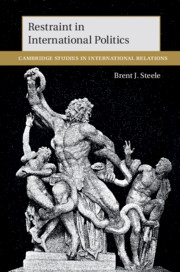Book contents
- Restraint in International Politics
- Cambridge Studies in International Relations: 151
- Restraint in International Politics
- Copyright page
- Dedication
- Contents
- Figures and Tables
- Acknowledgments
- Introduction
- 1 Restraint Appraised
- 2 Restraint and Actionism in Global Politics
- 3 The Historical (Ab)uses of Restraint
- 4 Democratic Restraint, Democratic Libido
- 5 Restraint, Anti-Climax, and Insecurity
- 6 Restraining Those Who Can’t Restrain Themselves
- Conclusion: Towards a Strategic Narrative of Restraint
- References
- Index
- Cambridge Studies in International Relations
4 - Democratic Restraint, Democratic Libido
Published online by Cambridge University Press: 25 October 2019
- Restraint in International Politics
- Cambridge Studies in International Relations: 151
- Restraint in International Politics
- Copyright page
- Dedication
- Contents
- Figures and Tables
- Acknowledgments
- Introduction
- 1 Restraint Appraised
- 2 Restraint and Actionism in Global Politics
- 3 The Historical (Ab)uses of Restraint
- 4 Democratic Restraint, Democratic Libido
- 5 Restraint, Anti-Climax, and Insecurity
- 6 Restraining Those Who Can’t Restrain Themselves
- Conclusion: Towards a Strategic Narrative of Restraint
- References
- Index
- Cambridge Studies in International Relations
Summary
This chapter explores how restraint functions within, through, and from democracies. It delineates generational analysis and how restraint fits into that theorization. It provides illustrations of generational conflict through three centuries of US history. Restraint appears in the form of areactivegeneration’s rejection of the ideologies and practices of actionist generations. The infrequency of restraint in US settings over the past three centuries can be explained because (1) reactive generations are only one of four types to emerge in US political settings and (2) reactive generations arerecessive(as opposed to dominant) and play a prominent role in the political, social, and cultural institutional settings of a polity for only brief (roughly one or two decades) periods of time.
- Type
- Chapter
- Information
- Restraint in International Politics , pp. 124 - 173Publisher: Cambridge University PressPrint publication year: 2019

